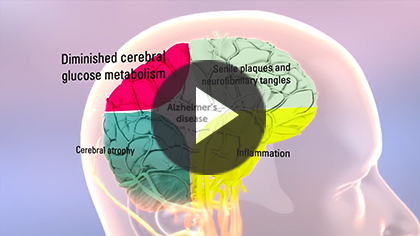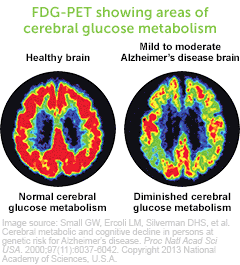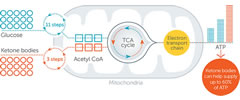The evidence: ketone bodies in Alzheimer’s disease
Preclinical research has demonstrated the beneficial effects of raised ketone body levels1,2
Ketone bodies protected cultured mouse hippocampal cells from amyloid-β toxicity1
- The addition of ketone bodies to 6-day cultured hippocampal neurons exposed to amyloid-β toxicity doubled the surviving cell number and increased cell size and neurite outgrowth compared with cells exposed to amyloid-β alone
A ketogenic diet decreased amyloid-β deposition in a mouse model of Alzheimer’s disease2
- Transgenic mice carrying the “London” APP mutation (APP/V7171) produced significant levels of soluble amyloid-β in the brain and exhibited extensive plaque deposition by 12 to 14 months. They demonstrated early behavioral deficits and represented a model of early onset familial Alzheimer’s disease
- In these mice, brief 43-day treatment with a low-carbohydrate/high-fat diet reduced total amyloid-β levels by approximately 25%
In a pilot study of 20 patients with mild to moderate Alzheimer’s disease or mild cognitive impairment3:
- Increasing ketone body levels in the brain improved performances in paragraph recall and on the Alzheimer’s Disease Assessment Scale–Cognitive subscale
These properties make ketone bodies an attractive means to address diminished cerebral glucose metabolism in Alzheimer’s disease. While ketogenic diets have a long and successful clinical history, the very high-fat diet needed to increase ketone body levels can be extremely difficult to manage and can have significant adverse events.4,5 Simply adding more glucose is not the answer either, as increasing blood sugar levels can be dangerous and impractical.6





